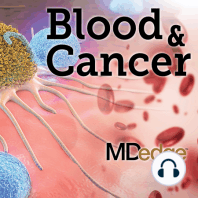25 min listen
Treatment approaches in AML
FromBlood & Cancer
ratings:
Length:
33 minutes
Released:
Feb 27, 2020
Format:
Podcast episode
Description
A diagnosis of acute myeloid leukemia (AML) was once an emergency, requiring immediate treatment. Today, the need to start treatment is still urgent, but many patients can benefit by waiting a few days for testing to reveal a fuller picture of the disease. That’s the advice of James M. Foran, MD, of the Mayo Clinic. He joins Blood & Cancer host David H. Henry, MD, of the Pennsylvania Hospital, Philadelphia, to walk through some patient scenarios and the newest treatment options. In Clinical Correlation, Ilana Yurkiewicz, MD, of Stanford (Calif.) University, talks about what patients do and do not remember from their visits. Practice points: Rapid testing results can drive important choices in the initial treatment of AML. Adjunctive therapies may improve survival by 7%-20% in appropriate patients. Although a total work-up may take up to 2 weeks, new research suggests it is feasible to get rapid sequencing/cytogenetic testing and assign treatment within 7 days. Treatment varies: Daunorubicin and cytarabine (Vyxeos) are still central treatment strategies, but there may be survival advantages (7%-20% improvement) by adding adjunctive therapies, if indicated. A few are listed below: Liposomal formulations of daunorubicin-cytarabine (CPX351) can have survival advantages in therapy-related AML or AML with myelodysplastic syndrome (MDS)-related changes. Gemtuzumab (Mylotarg) may be indicated for core binding factor (CBF) AML. Midostaurin (Rydapt) may improve survival in patients with FMS-like tyrosine kinase (FLT) 3 Enasidenib (Idhifa) may be indicated in patients with IDH mutations. Options for elderly patients: In a recent study, CC 486 (oral azacitidine) showed a significant survival advantage and remission duration in elderly patients with AML. The drug is not yet available but could eventually be a maintenance therapy option for patients who do not go on to transplant. Azacitidine, plus or minus an IDH2 inhibitor, showed much higher remission rates in elderly patients, but did not translate into a survival advantage. AML in the outpatient setting: Many patients with AML are being increasingly managed as outpatients, which ultimately will require a different kind of support infrastructure in our hospitals and clinics. Show notes by Debika Biswal Shinohara, MD, PhD, resident in the department of internal medicine, University of Pennsylvania, Philadelphia. Dr. Henry and Dr. Yurkiewicz reported having no financial conflicts relevant to this episode. Dr. Foran reported advisory board membership with Pfizer, Jazz Pharma, and Novartis. * * * For more MDedge Podcasts, go to mdedge.com/podcasts Email the show: podcasts@mdedge.com Interact with us on Twitter: @MDedgehemonc David Henry on Twitter: @davidhenrymd Ilana Yurkiewicz on Twitter: @ilanayurkiewicz
Released:
Feb 27, 2020
Format:
Podcast episode
Titles in the series (100)
Practice-changing research in GI cancer: , of the University of Pennsylvania, Philadelphia, joins Blood & Cancer host , also of the University of Pennsylvania, to review the top three GI cancer trials presented at the 2019 ESMO World Congress on Gastrointestinal Cancer, and how they are... by Blood & Cancer
